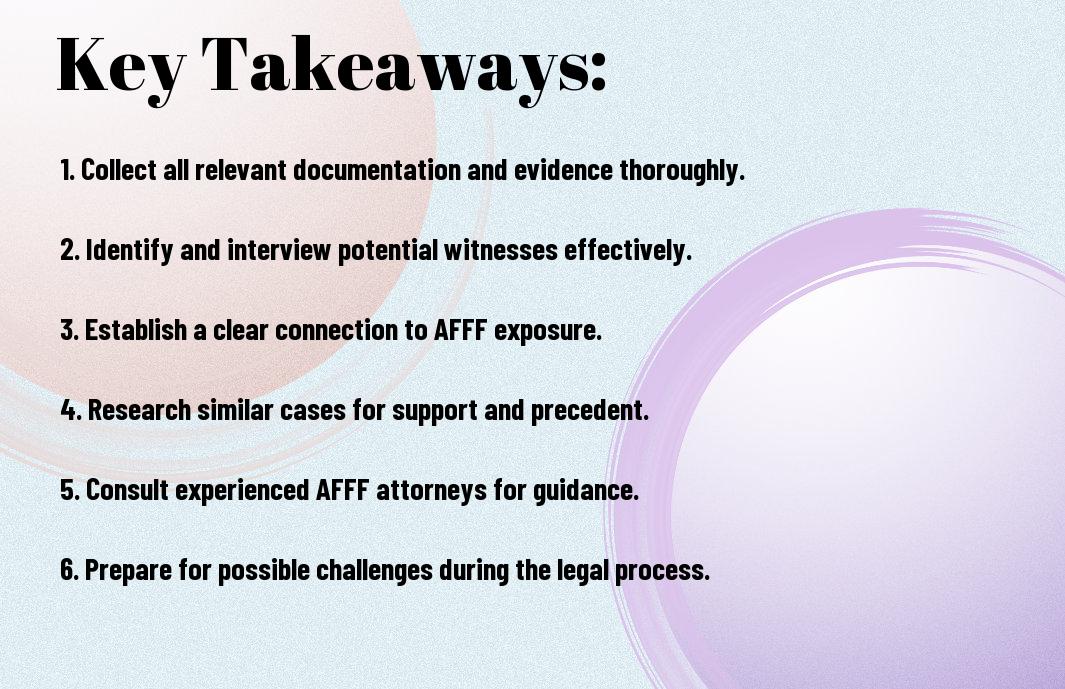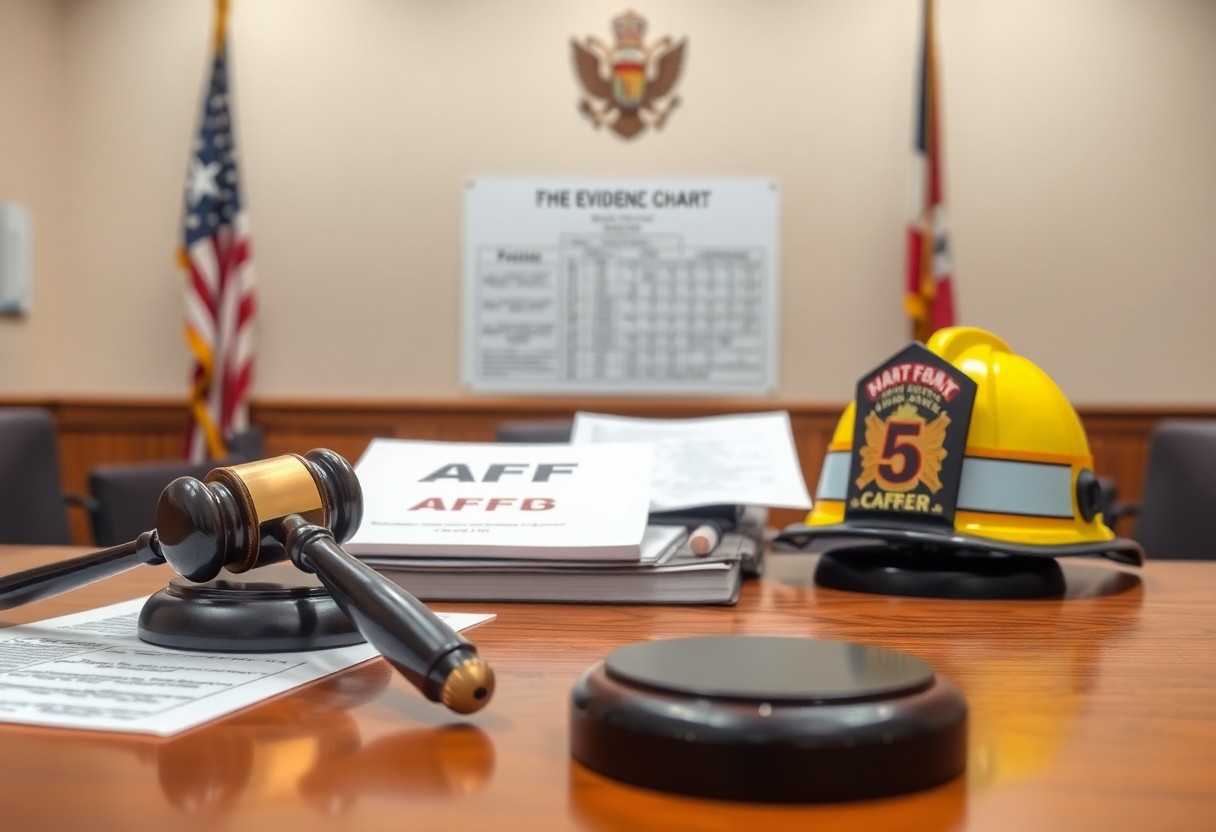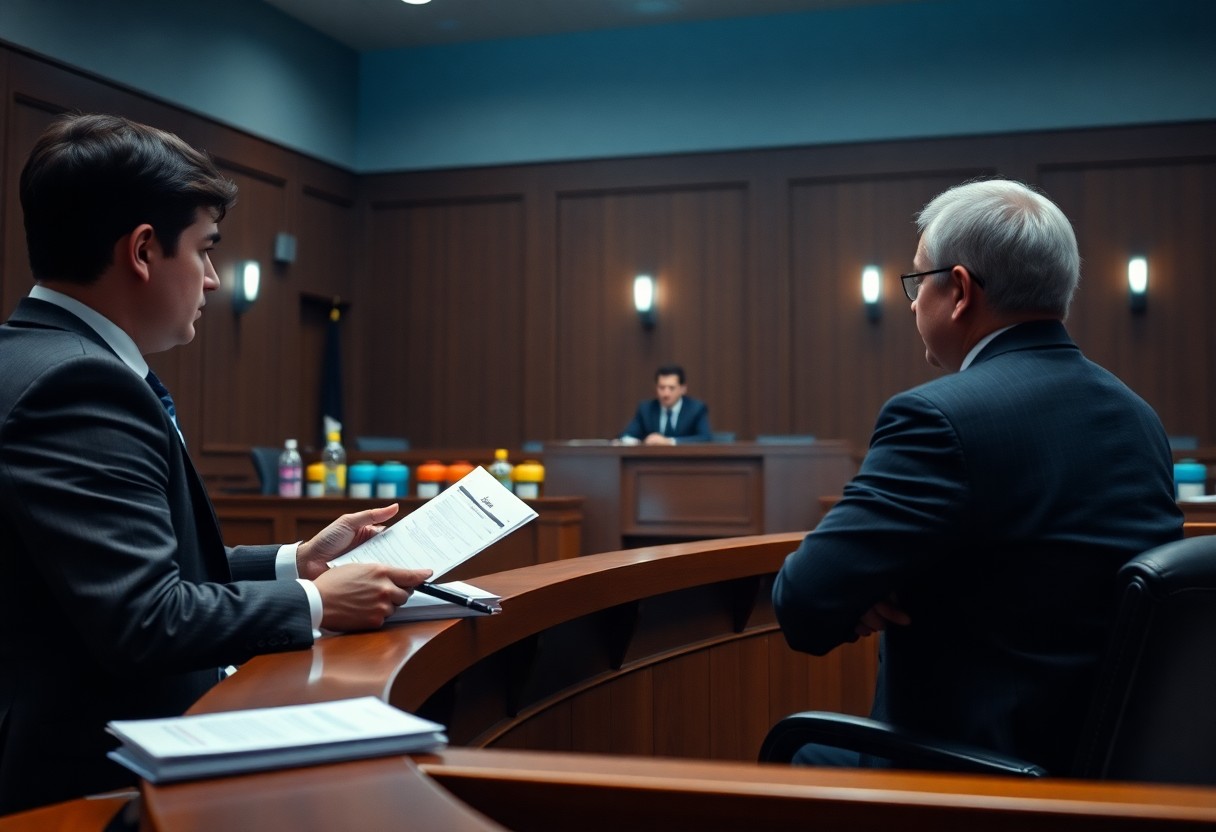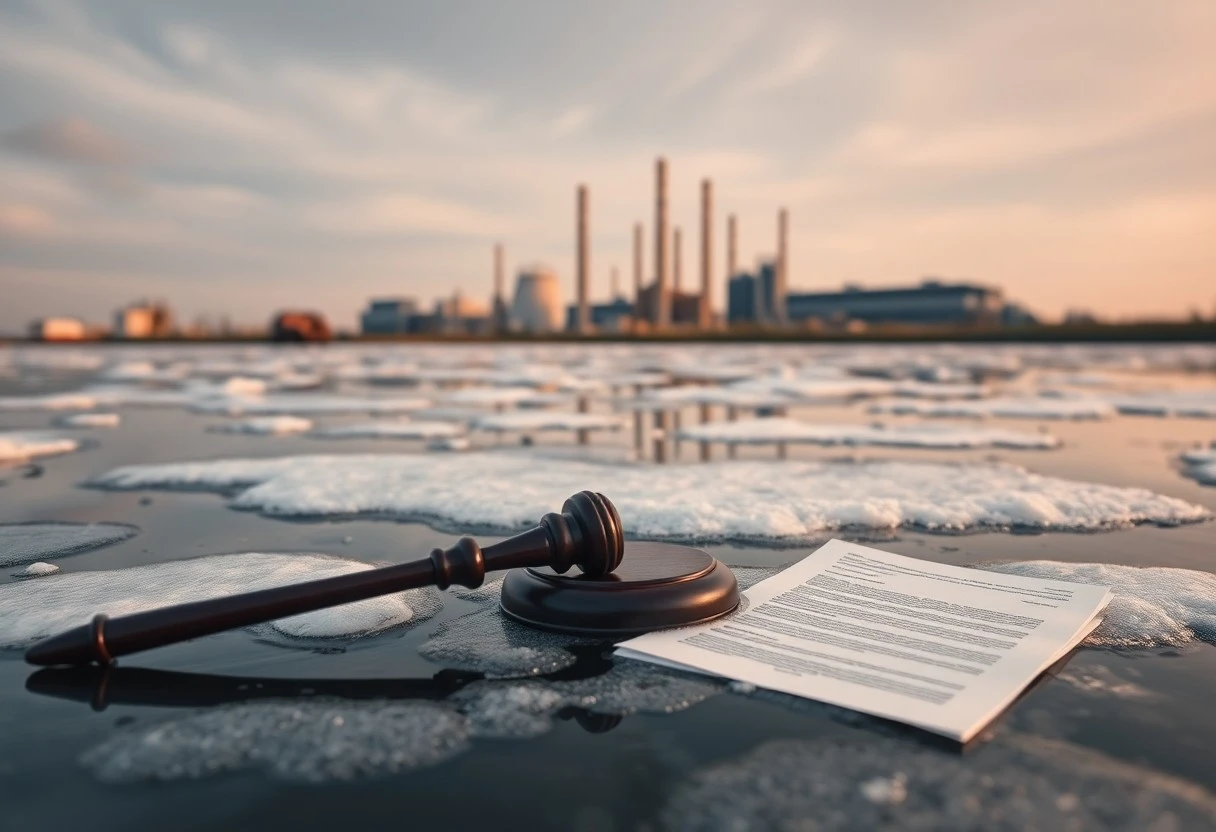There’s a significant need for you to understand the process of building a strong case with AFFF attorneys if you’ve been affected by toxic exposure from firefighting foam. This informative guide outlines five vital steps that will enhance your ability to seek justice and compensation. By familiarizing yourself with the legal framework and gathering necessary evidence, you position yourself strategically in your pursuit for accountability. Equip yourself with the right knowledge as you navigate this complex journey toward protecting your health and rights.
Understanding AFFF and Its Risks
Overview of AFFF
Among the various firefighting agents, Aqueous Film Forming Foam (AFFF) is often employed in emergency response situations to extinguish flammable liquid fires. This foam is composed of a mixture of water, foam concentrate, and a variety of chemical compounds. Designed for rapid application and effective suppression, AFFF has been extensively used by military and civilian fire services alike. However, its widespread use raises significant concerns regarding its environmental and health impact due to the persistent nature of its chemical components.
Health Implications
Overview of the health implications of AFFF usage highlights the potential risks you may encounter if exposed to this firefighting agent. Studies have indicated that the per- and polyfluoroalkyl substances (PFAS) found in AFFF can accumulate in your body over time, leading to various health issues. You may be at risk for problems such as liver damage, thyroid disorders, and certain types of cancer. Additionally, the even more alarming concern stems from the fact that these chemicals are often referred to as “forever chemicals” due to their resistance to breaking down in the environment.
At this point, it is imperative to grasp that exposure to AFFF can pose serious health risks. You should be particularly cautious if you have worked in environments where AFFF was regularly used or manufactured, as it can contaminate drinking water and food sources, further increasing your exposure risk. If you notice symptoms related to these health implications, consulting with a healthcare professional and seeking legal advice from experienced AFFF attorneys might be necessary to protect your rights and understand your options.
Identifying a Potential Case
Assuming you have been exposed to Aqueous Film Forming Foam (AFFF), the first step in building your case is to confirm that you indeed have a potential claim. This involves gathering detailed information about your exposure history. This includes when and where the exposure occurred, the duration of your exposure, and the type of activities during which you were exposed to AFFF. Understanding the landscape of potential liability will help you gauge the strength of your case.
Assuming exposure is established, the next aspect to assess is your health status. This involves considering any recent diagnoses that may correlate with AFFF exposure, such as cancer or respiratory issues. Documenting your health history in relation to your exposure can serve as solid evidence in your pursuit of justice.
Determining Exposure
Behind every potential case of AFFF-related illness is a complex web of exposure sources. You should look into specific locations where AFFF was used, such as military bases, fire training academies, or industrial sites. It’s important to collect documentation and witness accounts that can substantiate the extent and frequency of your exposure. Make sure to note any military or occupational duties that might put you in contact with AFFF, as these details can be pivotal in your case.
Also, ensure that you gather any available records from your employer or military service, as these may provide valuable information confirming your exposure to AFFF. Having documented evidence significantly strengthens your claim and provides a clearer picture of how long and to what extent you were exposed.
Recognizing Symptoms
Case studies reveal that many individuals exposed to AFFF develop various symptoms over time. You should be vigilant in observing any health changes or symptoms that develop. Common symptoms can include respiratory problems, skin irritations, and even more serious conditions such as cancer. It’s imperative to maintain a detailed record of any medical evaluations you undergo, as this documentation can be important in establishing a correlation between your symptoms and AFFF exposure.
Also, staying attuned to your body’s responses is vital. Promptly addressing any emerging symptoms can not only improve your quality of life but also serve as critical evidence in your case. You may also want to consult with medical professionals who specialize in environmental exposures to ensure that you not only receive the appropriate care but also compile comprehensive records of your symptoms and diagnoses. Your active role in recognizing and documenting these symptoms can have a significant impact on the strength of your AFFF case.
Gathering Evidence
If you are pursuing an AFFF lawsuit, gathering the right evidence can significantly impact the strength of your case. Your attorney will require substantial documentation to demonstrate the connection between your exposure to Aqueous Film-Forming Foam (AFFF) and any health issues you may have. This includes medical records, witness statements, and any relevant employment documentation. For more insights on the ongoing legal landscape surrounding AFFF, you can refer to the AFFF Lawsuit | Firefighting Foam January 2025 Update.
Medical Records
Along with your employment history, your medical records will be a vital component in establishing a link between your health issues and AFFF exposure. These records offer evidence of your diagnoses, treatments, and any ongoing medical care related to your health concerns. Be sure to compile all relevant information, including test results, therapy notes, and prescriptions, as this documentation will substantiate your claims and underscore the seriousness of your health situation.
Employment History
Before you proceed, review your employment history carefully, as it plays a pivotal role in demonstrating your exposure to AFFF. You should collect evidence of your job titles, dates of employment, and specific duties that involved handling or being in proximity to AFFF. This information can help corroborate your claims of exposure and its potential impact on your health.
Consequently, grabbing all pertinent documents like pay stubs, job descriptions, or even eyewitness accounts from colleagues can bolster your case. Highlighting your role in environments where AFFF was used will add weight to your claim, showcasing the levels of exposure you faced and painting a clear picture of how that exposure could have adversely affected your health. Your employment history is not just a background check; it’s a fundamental piece of your legal strategy.
Consulting with AFFF Attorneys
To build a solid case regarding AFFF (Aqueous Film-Forming Foam) exposure, it is necessary to consult with experienced AFFF attorneys. These legal professionals understand the complexities of product liability and personal injury laws as they pertain to harmful chemical exposure. By discussing your situation with attorneys who specialize in AFFF cases, you position yourself to navigate potential legal challenges and maximize your chance of receiving compensation for any damages incurred due to exposure.
Choosing the Right Attorney
Against a backdrop of numerous law firms claiming expertise in personal injury and toxic torts, selecting the right attorney for your AFFF case requires diligence and attention. Start by researching attorneys with a proven track record in handling chemical exposure claims, specifically those involving firefighting foams. Review case histories, client testimonials, and professional credentials to ensure you are engaging an attorney who understands the nuanced legal landscape surrounding AFFF litigation.
Initial Consultation
Any initial consultation with an AFFF attorney is a vital opportunity for you to present your case and gauge the attorney’s approach to representing clients. During this meeting, you can discuss the particulars of your situation, the extent of your exposure to AFFF, and any health issues you may be facing as a result. It’s your chance to ask pertinent questions about their experience, strategies, and potential legal outcomes based on your unique circumstances.
And it’s important to come prepared for this consultation with all relevant documentation, such as medical records and employment history. In this informative session, your attorney will evaluate the details of your case and outline the probable legal avenues available to you. They should also clarify the associated costs and how they charge for their services, ensuring you have a comprehensive understanding of what to expect as you move forward in your pursuit of justice.
Filing a Lawsuit
All successfully navigating the legal landscape around Aqueous Film-Forming Foam (AFFF) requires understanding the processes involved in filing a lawsuit. It starts with preparing your case adequately and ensuring that you have documented evidence of any injuries or damages you sustained due to AFFF exposure. Having an experienced AFFF attorney by your side can guide you through this complex terrain, ensuring that your filing adheres to all necessary protocols and statutory requirements.
Legal Procedures
Between gathering evidence and drafting the necessary documents, the legal procedures involved in filing a lawsuit can be intricate. You will need to complete vital paperwork, including a complaint that states your case and the damages you seek. Additionally, the defendant must be notified of your lawsuit through a process called service of process. It’s vital that these steps are executed correctly to avoid any delays or dismissals of your case.
Timeline for Filing
Beside understanding the legal procedures, you should also be aware of the timeline associated with filing your lawsuit. Each jurisdiction has specific deadlines known as statutes of limitations, which dictate how long you have to file your claim after discovering your injury. Failure to comply with these timelines can result in losing your right to pursue compensation for your damages.
Legal considerations surrounding timelines can vary significantly depending on your location and the specifics of your case. It’s important to consult with your attorney about these deadlines and ensure timely filing. Thorough review and adherence to the statute of limitations not only sets in motion the legal proceedings but also preserves your rights to make a claim effectively.
Navigating the Legal Process
Many individuals find the legal process overwhelming, especially when dealing with complex cases like those involving AFFF contamination. It is important to have a structured approach to effectively navigate through the various stages that will unfold in your case. Understanding what to expect and being prepared can significantly impact the outcome. As you launch on this journey, staying informed can help you protect your rights and advocate for any compensation to which you may be entitled.
Discovery Phase
Any successful case hinges on the discovery phase, where relevant facts and evidence are gathered to strengthen your claim. During this phase, both parties exchange information and documents related to the case. This is your opportunity to uncover important evidence that supports your allegations against the manufacturers of AFFF. It’s vital to work closely with your attorneys to identify what data is needed and to ensure that you respond to requests in a timely manner.
Court Proceedings
Discovery is followed by court proceedings, which can involve hearings, motions, and potentially a trial. This phase is where you will present your case before a judge or jury. Your attorney will play a significant role in strategizing how to best present your evidence, witness testimonies, and other pertinent information. Understanding the procedural rules and timelines is key, as these factors can influence your case significantly.
But navigating court proceedings can be daunting, and the stakes are high. If your case goes to trial, you may face rigorous questioning and scrutiny from the opposing side. A strong legal strategy is vital during this stage to counter any arguments raised against you. It’s imperative to trust your attorneys to guide you through this intricate process, as they will advocate on your behalf to help ensure that your story is told effectively and persuasively, boosting your chances of a favorable outcome.

Conclusion
Upon reflecting on the five crucial steps to building a strong case with AFFF attorneys, you gain a clearer understanding of the complexities involved. By gathering detailed evidence, documenting your experiences, and consulting with knowledgeable professionals, you set a solid foundation for your claim. Each of these steps not only aids in presenting your case effectively but also empowers you to navigate the legal landscape with confidence. Your proactive approach in following these steps can lead to a more comprehensive and persuasive argument, increasing your chances of a favorable outcome.
As you move forward in this legal journey, it is vital that you remain organized and focused. Engaging with specialized AFFF attorneys who understand the intricacies of your situation will provide you with the expertise needed for a successful case. By diligently adhering to each step outlined, you enhance your ability to articulate the impact of AFFF exposure on your life, thereby capturing the attention of the courts and contributing to the broader conversation surrounding these significant issues. Take charge of your case and ensure that your voice is heard in this pivotal legal process.
















